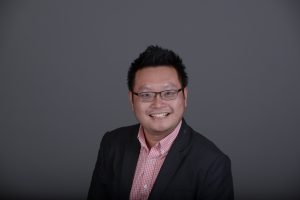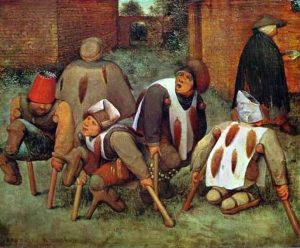Welcome, New History Professor, Wayne Tan!

By Professor Wayne Tan
Here I am sitting in the comfort of my office, the newest faculty member in the awesome History Department! As I’m writing this blog post, I can’t help but reflect on the one thing that I sometimes take for granted: my journey to work. I mean it in the physical sense of getting to the workplace. My office, as you might well know, is located on the 3rd floor of Lubbers Hall. On the many days when I am brimming with energy, I race up the 4 big flights of stairs to the 3rd floor without much effort. But, I can remember just as many days when I wouldn’t lift up my leaden feet and would consciously choose the convenience of a ride in the elevator.
I realize, however, that this flexibility of choice is a privilege. And, indeed, it is an immense one. How would I, if in a wheelchair-bound state, have reacted to the predicament when the elevator broke down (on the several occasions when it actually did)? What if my vision failed me someday, and I couldn’t find my way upstairs, past the heavy nondescript doors and down the hallways? Or, what if I was so seized by a paralyzing fear of heights or falling that I couldn’t venture beyond the first step? These questions seem to have a hypothetical ring to them—the imponderable what-ifs in life. Yet they are real issues to those among us who labor under the value-laden label of disability—physical, sensory, mental, and intellectual disabilities. In fact, these individuals, whom we are quick to call disabled, have populated the pages of history, at times fading out of the collective historical consciousness. As a corrective to the general linear narrative of progress, I have made them the subjects of my own research in disability studies, my field of interest and specialty.
You might ask, “Why should disability matter at all?” I’d like to invite you to join me in exploring this question in my new course “Disability and Medicine in Global History” in Spring 2017. My short answer: disability matters to us because it is about difference—being different, celebrating difference, and using difference as the starting point of our introspective frames of mind. Modern times have much to teach us. But so does our distant past. One guiding philosophy comes from 11th-century Chinese Neo-Confucian thought. Virtue, it is said, comes from knowing how to examine the things that are close at hand. No project is too daunting or ambitious, if we set our sights on the stuff of everyday life—our routines, activities, and encounters, however ordinary they may seem.

HIST 295: Disability and Medicine in Global History
MWF 1PM-1:50PM (Spring 2017)
This is what History is all about, as well: an attitude toward learning. I am heartened by what I know, but even more encouraged to seek gems in the lessons I had not known. How much more joy I would reap if I should begin learning, not through any express recourse, but instead, one step at a time! Step by step, flight by flight, and level by level. Patiently, mindfully, and purposefully. That journey, in my view, is also a privilege.

